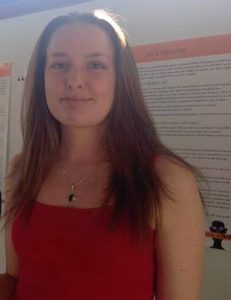 Lucia Crowther graduated in 2015 with a degree in Italian and History of Art. An excellent and committed student throughout her degree, Lucia was the recipient of the Meneghello-Italianist UG Prize for outstanding academic achievements in Italian Studies. Her dissertation entitled ‘The architectural formalisation of pilgrimage in the portico of the Madonna di San Luca’ was awarded the prestigious British-Italian Society Memorial Rooke Prize for the best UG dissertation in Italian Studies in 2016.
Lucia Crowther graduated in 2015 with a degree in Italian and History of Art. An excellent and committed student throughout her degree, Lucia was the recipient of the Meneghello-Italianist UG Prize for outstanding academic achievements in Italian Studies. Her dissertation entitled ‘The architectural formalisation of pilgrimage in the portico of the Madonna di San Luca’ was awarded the prestigious British-Italian Society Memorial Rooke Prize for the best UG dissertation in Italian Studies in 2016.
In 2016, Lucia won a full EU-funded Unibo Azione 2 scholarship from the University of Bologna to attend an extremely selective two-year Master’s programme in Visual Arts.
Let’s hear how she is settling in the world’s oldest university.
One year on
I’d never formally studied Italian before I began my bachelor’s degree, so in some ways it feels quite surreal to find myself where I am now. One year after graduating from Reading I’m living in Italy and doing my Master’s degree at the University of Bologna. This is the city I came to for my Erasmus year, and I think I’m only just now appreciating how much that year abroad and my whole degree experience at Reading changed my life.
I still remember the first evening I ever spent in Bologna. Late in the day, standing in a bar in the centre of town surrounded by a crowd of new local friends, someone asked me if I was happy to have chosen the city for my Erasmus placement. I shouted back over the music that I was delighted, and couldn’t wait to try my first spaghetti bolognese. Well, the whole place went silent. I now know, as I’m sure almost everyone reading already does too, that ‘spag-bol’ does not exist in Bologna, and that the locals can spot a tourist a mile away as anyone who doesn’t know that tagliatelle al ragù is the dish to ask for in the Italian capital of food.
That evening taught me a few lessons: firstly, the people of Bologna are among the friendliest, kindest and most forgiving on Earth. The impromptu night-time tour of the city I was given a few hours later was testament enough to that. But secondly, if you move to a new country you will never stop learning new things, and your life will never be dull (whether you want it to be or not!). That’s why I knew I had to come back, one way or another, and at the beginning of September I unpacked my suitcase here for the second time.
After the brilliant Italian language and culture teaching I had at Reading, I felt confident enough to apply directly to Bologna earlier this year. I was lucky enough to be awarded one of the scholarships reserved for international students, and I realised that Italian universities are really welcoming to foreign students. My MA is in the Visual Arts, which is the perfect subject to study in a country so full of beautiful art and architecture, and it’s also really interesting to see how different the postgraduate degrees are over here. I’m able to study a really broad range of topics, so my courses this year range from art restoration, to iconography, to Museum studies. I’ve also made so many new Italian friends in Bologna, and every time I manage to get though a whole day without saying anything inappropriate about their pasta I feel like an honorary Italian all over again.
It’s not for the faint hearted, however. Italian students usually write 30 – 50,000 word dissertations to graduate from their MA courses, so I’ve got all that to looks forward to next year! But while I was at Reading I already managed to do so many things I never thought I’d be able to. I never expected to go from zero Italian to let’s-move-to-Italy-and-start-a-new-life standards, but my degree got me there. And that’s not all: during my second year my tutor Dr La Penna helped me to get a placement as a research assistant with the Undergraduate Research Opportunities Programme (UROP), so I contributed to the databases of the Diasporic Literary Archives project and learned so much from working with researchers from across the University. Then in my final year a module with Dr Faloppa gave us the chance to replace an essay with a personalised project, so I was able to curate an exhibition based on my favourite charity, Amnesty International. After all those different experiences, to mention just a few, I don’t feel worried about taking on a new challenge, and being in this stunning city is all the inspiration I need.
So if you want to see what is, in my opinion, one of the most under-appreciated, lively and cultured cites in Europe, then come and visit any time! You’ll have a lot of new friends before the first night is even over, and if you can get through a whole evening without mentioning spaghetti then it might just be safe to show you where they do the best tagliatelle al ragù in town…

